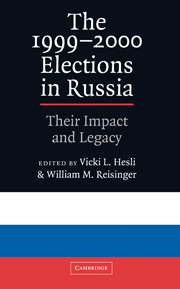Book contents
- Frontmatter
- Contents
- Contributors
- Acknowledgment
- SECTION I INTRODUCTION
- SECTION II PARTIES IN THE ELECTORATE
- SECTION III THE ROLE OF REGIONAL POWER
- SECTION IV PARTIES AND INSTITUTIONS
- 8 Instrumental Democracy: The End of Ideology and the Decline of Russian Political Parties
- 9 The Impact of the 1999–2000 Parliamentary and Presidential Elections on Political Party Development
- 10 Resolving the Problem of Preelection Coordination: The 1999 Parliamentary Election as an Elite Presidential “Primary”
- 11 Coalition Politics in the New Duma
- SECTION V CONCLUSION
- Bibliography
- Index
11 - Coalition Politics in the New Duma
Published online by Cambridge University Press: 23 October 2009
- Frontmatter
- Contents
- Contributors
- Acknowledgment
- SECTION I INTRODUCTION
- SECTION II PARTIES IN THE ELECTORATE
- SECTION III THE ROLE OF REGIONAL POWER
- SECTION IV PARTIES AND INSTITUTIONS
- 8 Instrumental Democracy: The End of Ideology and the Decline of Russian Political Parties
- 9 The Impact of the 1999–2000 Parliamentary and Presidential Elections on Political Party Development
- 10 Resolving the Problem of Preelection Coordination: The 1999 Parliamentary Election as an Elite Presidential “Primary”
- 11 Coalition Politics in the New Duma
- SECTION V CONCLUSION
- Bibliography
- Index
Summary
That keen observer of Russian politics, Viktor Chernomyrdin, is supposed to have commented that “no matter what party we try to create, it always turns out to be the CPSU.” Presumably he meant that Russian political parties invariably turn out to intertwine themselves with the state, drawing on the state for political resources instead of cultivating a base of independent mass support. Russia has a “floating party system,” according to Richard Rose. Lacking roots in the electorate, the parties are instruments by which politicians keep themselves in power but avoid accountability to the voters. Electoral parties appear and disappear, and voters cannot reliably judge a party by its past performance or trust its promises for the future. The demand for parties, Rose argues, is not matched by a corresponding supply (Rose 2000; Rose, Munro, and White 2001).
Political scientists postulate that modern democracy requires political parties to organize and structure political conflict, channeling the ambitions of politicians into open political competition, and defining public-policy alternatives that enable the electorate to make meaningful choices (Schattschneider 1960; Aldrich 1995). When it is working effectively, a competitive party system is an indispensable means of solving crucial collective action problems both for political elites and the general public. The continuing weakness of political parties in Russia, as several of the authors in this volume observe, fatally undermines Russia's formally democratic political institutions.
- Type
- Chapter
- Information
- The 1999–2000 Elections in RussiaTheir Impact and Legacy, pp. 232 - 258Publisher: Cambridge University PressPrint publication year: 2003
- 4
- Cited by

